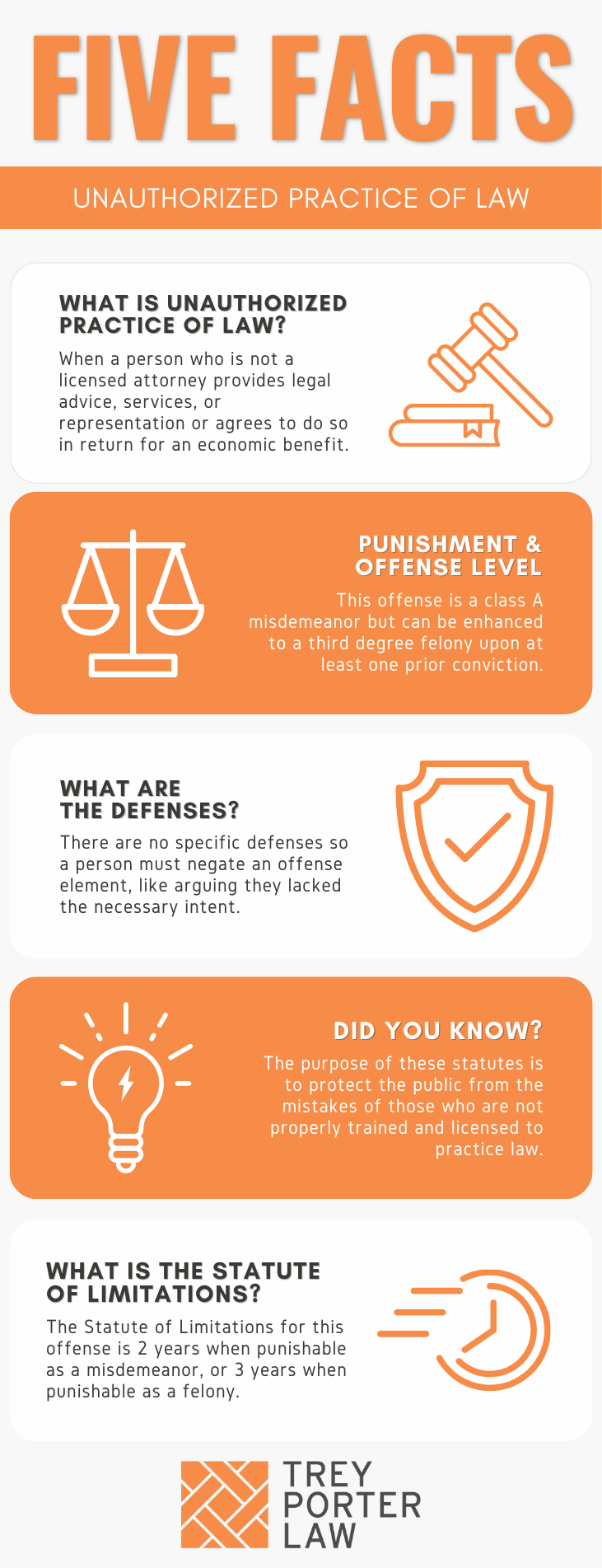WHAT IS UNAUTHORIZED PRACTICE OF LAW IN TEXAS?
The Texas law against unauthorized practice of law prohibits lay persons and lay agencies, such as insurance companies, support staff in law offices, and other unlicensed individuals and corporations from practicing law. Issues regarding the unauthorized practice of law arise in the context of personal injury or property damage claims, or contracting with someone to select and retain an attorney.

WHAT IS THE UNAUTHORIZED PRACTICE OF LAW LAW IN TEXAS?
Tex. Penal Code § 38.123. UNAUTHORIZED PRACTICE OF LAW.
(a) A person commits an offense if, with intent to obtain an economic benefit for himself or herself, the person:
(1) contracts with any person to represent that person with regard to personal causes of action for property damages or personal injury;
(2) advises any person as to the person’s rights and the advisability of making claims for personal injuries or property damages;
(3) advises any person as to whether or not to accept an offered sum of money in settlement of claims for personal injuries or property damages;
(4) enters into any contract with another person to represent that person in personal injury or property damage matters on a contingent fee basis with an attempted assignment of a portion of the person’s cause of action; or
(5) enters into any contract with a third person which purports to grant the exclusive right to select and retain legal counsel to represent the individual in any legal proceeding.
(b) This section does not apply to a person currently licensed to practice law in this state, another state, or a foreign country and in good standing with the State Bar of Texas and the state bar or licensing authority of any and all other states and foreign countries where licensed.
(c) Except as provided by Subsection (d) of this section, an offense under Subsection (a) of this section is a Class A misdemeanor.
(d) An offense under Subsection (a) of this section is a felony of the third degree if it is shown on the trial of the offense that the defendant has previously been convicted under Subsection (a) of this section.
WHAT IS THE PENALTY CLASS FOR UNAUTHORIZED PRACTICE OF LAW IN TEXAS?
Unauthorized practice of law is a Class A misdemeanor, punishable by up to one year in jail. If a person is convicted of unauthorized practice of law, and subsequently charged with the same offense, the second offense is enhanced to a third degree felony, punishable by two to ten years in prison.
WHAT IS THE PUNISHMENT RANGE FOR UNAUTHORIZED PRACTICE OF LAW IN TEXAS?
Unauthorized practice of law charged as a Class A misdemeanor carries a possible jail sentence of up to one year, and a maximum fine of $4,000. A person charged with third degree felony unauthorized practice of law faces between two and ten years in prison, and up to a $10,000 fine.
WHAT ARE THE PENALTIES FOR UNAUTHORIZED PRACTICE OF LAW IN TEXAS?
A person charged with unauthorized practice of law may be eligible for probation after a conviction, or deferred adjudication without a conviction. Community supervision for a Class A misdemeanor may not exceed two years. For a third degree felony, the supervision period ranges between two and ten years.
WHAT ARE THE DEFENSES TO UNAUTHORIZED PRACTICE OF LAW IN TEXAS?
The statute does not authorize specific defenses to the unauthorized practice of law. A person accused thereof may attempt to negate at least one of the elements the State must prove at trial.
WHAT IS THE STATUTE OF LIMITATIONS FOR UNAUTHORIZED PRACTICE OF LAW IN TEXAS?
The limitation period for unauthorized practice of law charged as a Class A misdemeanor is two years. If it is enhanced to a third degree felony, the limitation period is three years.
UNAUTHORIZED PRACTICE OF LAW IN TEXAS
The purpose of prohibiting unauthorized practice of law is to protect the public from the mistakes of those who are not properly trained and licensed to practice law.
TEXAS UNAUTHORIZED PRACTICE OF LAW COURT CASES
The case law regarding unauthorized practice of law in Texas explains the law and conflicts of interest.
- In Unauthorized Practice of Law Comm. v. Am. Home Assur. Co., the Texas Supreme Court has held a liability insurer does not engage in the practice of law by using its staff attorneys to defend claims against insureds, provided the insurer’s and insured’s interests are congruent, and the staff attorneys disclose their affiliation with the insurer to the insured. Their interests are congruent when they are aligned in defeating the claim, and there is no conflict of interest between the insurer and the insured.
















